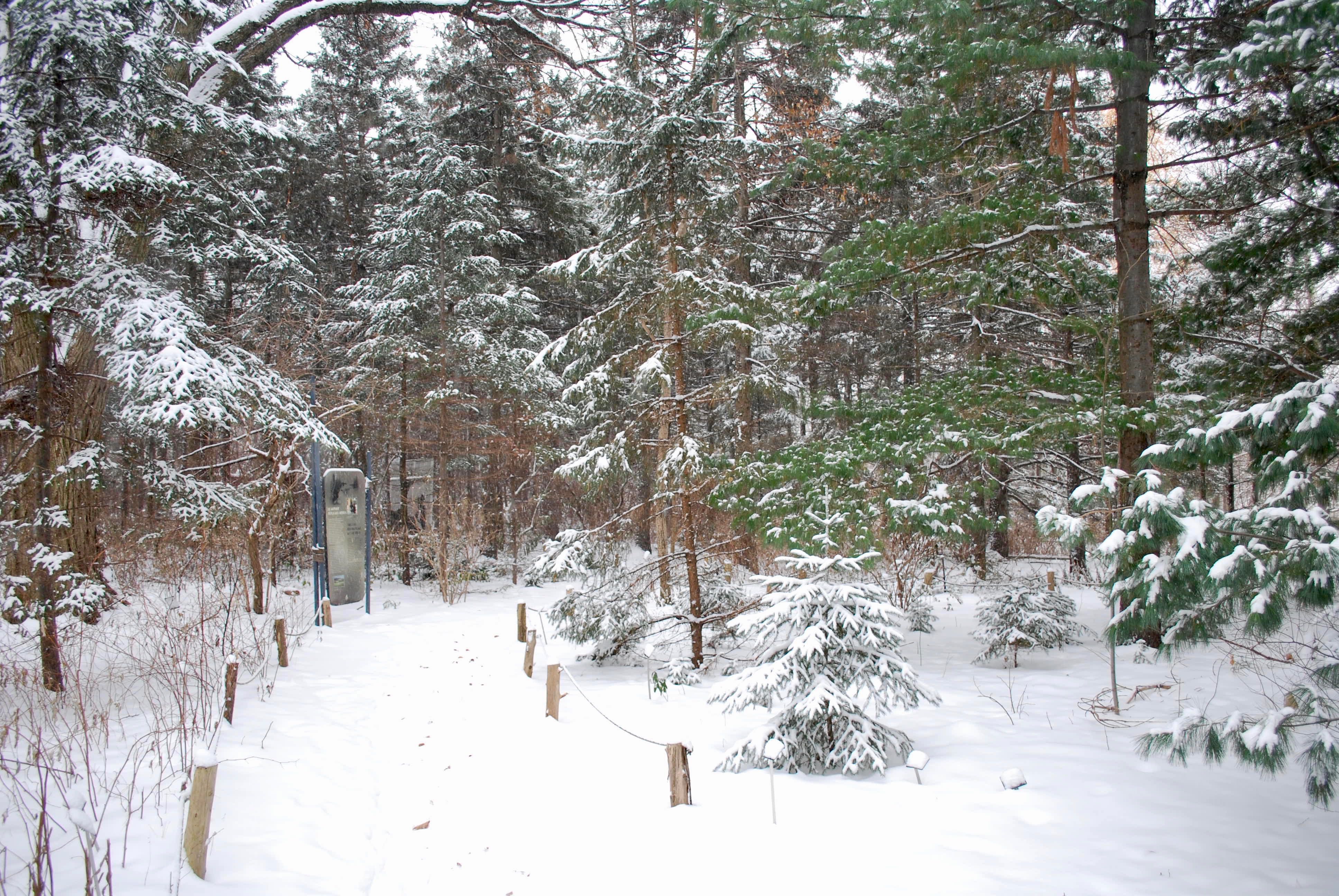Two students explore the history of Montreal’s First Nations in the Botanical Garden
The Olympic Stadium looms in the background as snow slowly falls on The First Nations Garden. Part of the Montreal Botanical Garden, the installation was founded in 2001 with the help of Innu singer Florent Vollant. While the rest of Montreal resembles any other North American metropolis, the garden is one of the few spaces in the city that still honours its Indigenous history. However, the relationship between Indigenous knowledge and urban spaces is much more complex than a single spot in the middle of the city.
According to the Espace pour la vie Montréal website, the garden is intended to represent the knowledge of Montreal First Nations. “Native people were ecologists before the term was ever coined,” the website reads. “Over time, they acquired an intimate knowledge of nature, knowing exactly where in its natural habitat to find a particular plant to meet a specific need.” This knowledge has been suppressed by settlers’s hegemonic education system that values European traditions and actively subordinates Indigenous knowledge in the process. This settler legacy is reflected in the way the city is designed; there is a lack of visual indication that Montreal is on unceded land.
The Olympic Stadium, which stands directly beside the garden, is quite indicative of the city’s priorities. The stadium is a representation of the way Montreal sought to attract visitors, grow its economy and give the city international recognition—during the Olympics, all eyes were on Montreal. The economic benefits of the stadium did not necessarily go according to plan, with maintenance costing millions of dollars, making the stadium a financial burden. According to CBC, the project cost taxpayers more than $1.5 billion dollars, despite the fact that then-mayor Jean Drapeau said there would be no deficit.
The Saint Lawrence River also suffers. Mohawks, or Kanien’keh, have a special tie to the river; it is a place for traditional fishing, which provides people with a constant source of sustenance. Despite this, the Saint Lawrence is polluted and uncared for. In an interview with the CBC, Eric Kanatakeniate McComber, a local traditional fisherman, spoke about the state of the river, saying “People are so detached from the river now, they only notice it when they go over the bridge or to go to the movies. We were people of the river here, before the seaway was made 60 years ago. People used to live and fish off that river.”
This is why the First Nations Garden is important—it is a physical space that represents knowledge that has long been suppressed in Montreal. The garden provides information about plants, crafts and activities that various First Nations around Montreal continue to practice and engage with. Plaques around the garden inform visitors of the traditions and practices of various tribes. One plaque explains the differences between the canoe bark of each of the Nations; Malecite canoes have very elaborate decorations, while the Cree canoe is more rough. Birchbark was also used to make baskets and decoys with designs inspired by plants and animals, sometimes with a geometric flare.
The organizers and builders of the garden consulted with various First Nations about what to include in it. One of these features is a sweat lodge, a structure made for a ritual meant to cleanse the mind and spirit, while also serving as a rite of passage. It is said that sweat lodges are also used in a ceremony to transition from one life stage to another. According to one of the plaques, from the mid 1800s until 1951, the Canadian government banned the use of sweat lodges, which affected the dissemination of traditions in many Indigenous communities. The garden’s designers decided to include a sweat lodge in order to provide a space to alleviate the stresses that Indigenous people face.
Mohawk elder Sedalia Fazio conducts the sweat lodge ceremonies in the garden. Fazio is outspoken when it comes to the violence that Indigenous people face. At a recent public inquiry for mistreatment of Indigenous people in Quebec, she condemned the not-guilty ruling of the killing of 22-year-old Colten Boushie.
In the city, places like the First Nations Garden are reflections of how Indigenous spaces are distinct and cordoned off, instead of being incorporated into the population’s everyday life. The colonial impact on Montreal is felt everyday, but is practically invisible to settlers. For example: Montreal’s streets are named after colonial explorers and officials. This city sits on unceded Indigenous territory, yet there are many representations of European colonialism, and very little of Indigenous peoples. According to Francis Adyanga Akena, a professor of education who studied the relationship between colonialism and the production of Indigenous knowledge in Uganda, Western education systems devalue Indigenous knowledge. This stifles the growth and emancipation of Indigenous knowledge in society as a whole, and within Indigenous communities as well.
At a time when we are finally beginning to acknowledge the cultural, ecological and spiritual value of Indigenous peoples, it is crucial to also question the European foundation of Montreal.
By fostering more Indigenous places in cities, like the Native Friendship Centre of Montreal and the First Nation Garden, we can challenge the hegemony of European settler values and knowledge systems.
Story and photos by Hussain Almahr and Maria Lucia Albarracin
